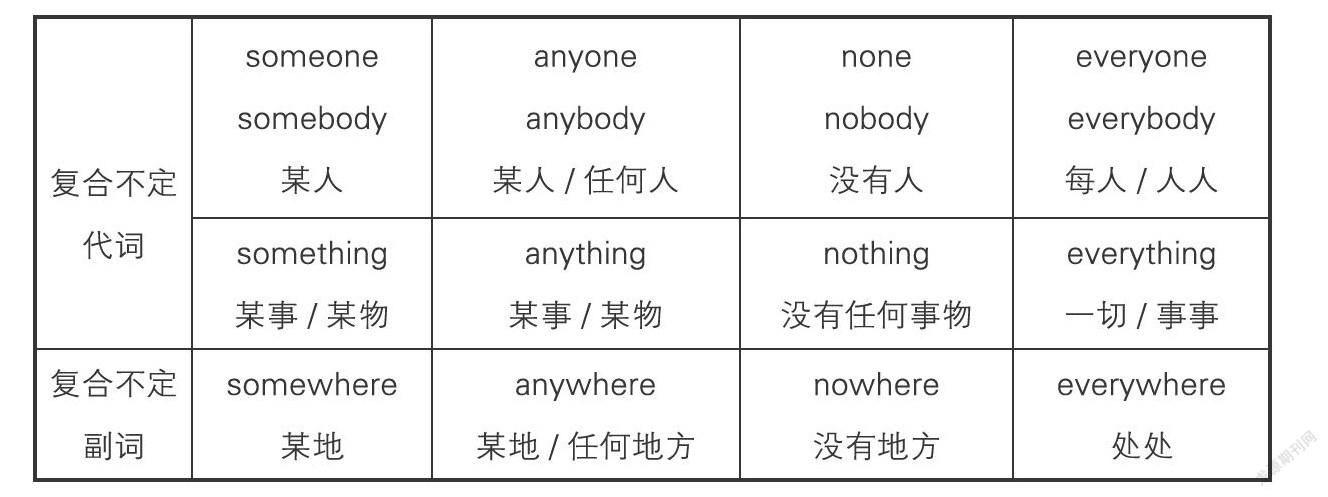复合不定代词和不定副词 用法指南
2021-09-10王峰
王峰

一、复合不定代词及复合不定副词归纳。
二、复合不定代词作主语时,谓语动词要用单数形式。
例:Everyone knows me here.
三、形容词修饰复合不定代词时要放在后边。
例:There is something new in today’s newspaper.
四、any以及any构成的词多用于否定句、疑问句、if条件句和含否定词的句子中。
例:If you don’t want anything,please let me know.
He is too busy to see anyone come in.
The boy is too heavy for anyone to carry.
注意:① any以及any构成的词在否定句中不可作主语而应换成相应的词。
② any以及any构成的词在否定句中为完全否定。
not ... any = no
not ... anyone / anybody = none / nobody
not ... anything = nothing
not ... anywhere = nowhere
例:Anyone doesn’t know me here. 应改为No one knows me here.
I can’t see anything in the room. = I can see nothing in the room.
③ any以及any构成的词也可用于肯定句。
any 任何一个 anyone = anybody 任何人 anything 任何事物
例:He is taller than anyone else in my class.
五、every以及every构成的词在否定句中为不完全否定。
例:He knows everything. 与之对应的否定句:He knows nothing.
而不能改成He doesn’t know everything. 他不是事事都懂(否一部分)。
六、表示人的复合不定代词用人称代词、物主代词替换时一般用复数形式,有时又可用单数,这要根据上下文来决定。
例:If anyone invites you,you have to meet them on time. (前面用单数,后面是宾格复数them)
No one knows me here,do they?(前面用单数,后面是复数they)
Everyone is doing their homework now.
If anyone calls me,tell him / her to call back after 8:00.
拓展思维:人称代词有主格宾格之分,主格有I,he,she,it,you,we,they,宾格有me,him,her,it,you,us,them。主格的要放在主語位置,宾格的要放在宾语位置。主语位置一般放在句首,如:I am a teacher.在英语中。宾语有两个位置,一个在动词后跟宾语,注意不是所有的动词都需要跟宾语;另一个在介词后跟宾语。如:I give him a book. 这里的give是动词,him是give的宾语(宾语的作用是使谓语所表达的意思更加完整和清楚),所以这个位置上用的是人称代词,宾格形式,而不能用主格he。
七、none做主语时,谓语可单可复。
例:None of us go / goes to school by bus.
None of us is a cook.
【测一测】
1. All of us were invited,but of us came.
A. neither B. none C. both
2. She listened carefully,but heard .
A. anyone B. someone
C. everyone D. nothing
3. — Do you have to say for yourself?
— No,I have to say.
A. something;everything
B. nothing;something
C. everything;anything
D. anything;nothing
4. Why not ask to help you.
A. everyone B. someone
C. anyone D. none
5. — “There isn’t water here. Could you get for me?”
— “All right. ”
A. some;some B. any;any
C. some;any D. any;some
6. Today, trees are still being cut down somewhere in the world.
A. much too B. too much
C. many too D. too many
7. There’s with his eyes. He’s OK.
A. anything wrong B. wrong something
C. nothing wrong D. wrong nothing
8. —“Haven’t you forgotten ?”
—“ ,oh,forgot my bag. ”
A. anything;Excuse me
B. something;Excuse me
C. something;Pardon
D. everything;Pardon
9. Put it down,Richard. You mustn’t read
letter.
A. anyone’s else’s B. anyone’s else
C. anyone else’s D. anyone else
10. Be quiet!I have to tell you.
A. important anything
B. anything important
C. important something
D. something important
Keys:BDDBD DCACD
